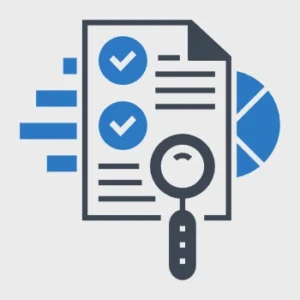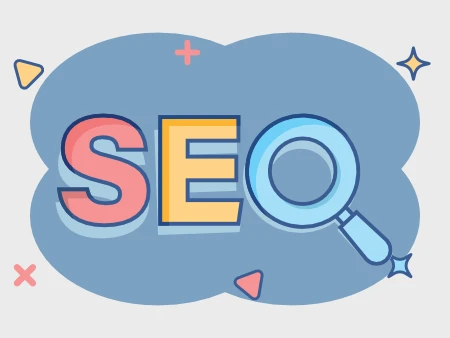SEO, or Search Engine Optimization, refers to the practice of optimizing websites to improve their visibility in search engine results pages. It greatly increases the chances your content will find its way to your intended audience. By optimizing your site with targeted keywords and crafting quality content, you increase your chances of ranking higher in search results. This is important because websites on the first page of search results are far more likely to be visited, driving more organic traffic your way.
Beyond visibility, SEO helps build credibility and trust with your audience, making it a key component of your digital strategy. Learning more about SEO will help you maximize its benefits for your website (and your business), so keep reading!
Key Takeaways
- 💡 SEO Definition & Importance: SEO enhances website visibility with targeted keywords and is vital for attracting organic traffic and building trust with users.
- 🕷️ Search Engine Operations: Search engines use crawling and indexing to organize information and rank results based on relevance and quality.
- 📊 Types of SEO: On-Page SEO optimizes website content, Off-Page SEO builds site reputation, and Technical SEO focuses on performance and user experience.
- 🔍 SEO Best Practices & Audit: Ethical SEO practices, including audits, keyword research, competitor analysis, content optimization, and link building, are crucial for improving search rankings.
- 🖌️ Content & Link Strategy: Creating valuable content aligned with user intent and implementing effective link building strategies are key for enhancing SEO performance and site authority.
What is SEO?
SEO stands for Search Engine Optimization, and is the specialized process of optimizing a website to increase its visibility in search engine results pages (SERPs) organically. This will ensure your content reaches its intended audience more effectively. At its core, SEO involves using specific keywords and good content to boost your website’s search engine ranking. It helps attract organic traffic and connect with your target audience online, which is vital for online success. Without it, your content may go unnoticed.
Why is SEO Important?
SEO is important because it directly impacts your visibility in search results, making your site rank higher. It’s not just about appearing first; it’s about capturing the attention of those actively searching for your products and services in a world flooded with information.
The importance of SEO lies in its ability to improve organic search engine results, which are more trusted by users than paid advertisements.
A higher ranking means more visibility, leading to more traffic and potential conversions. By incorporating SEO into your digital strategy, you’re leveraging the vast power of search engines to work in your favor, ensuring your message isn’t just heard, but seen by the right audience.
How do Search Engines Work
The search engines are very complex systems, but broadly speaking, they work by using a process known as crawling and indexing to discover and organize information on the internet.
The first step is for the search engine to send out web crawlers, also known as spiders or bots, to browse through websites and gather data. These search engine crawlers follow links on websites to find new pages and content. Once the crawlers collect information, it is then stored in a massive database known as an index.

When a user enters a search query, the search engine uses algorithms to match the query with relevant content in its index. The search engine then ranks the results based on various factors, such as the relevance of the content, the quality of the website, and other SEO considerations. The most relevant and high-quality content is displayed to the user on the search engine results page.
Different Types of SEO
There are different types of SEO that you should be aware of: On-Page SEO, Off-Page SEO, and Technical SEO. Each one plays a unique role in boosting your website’s rankings and driving organic traffic. In addition to the three main types of SEO, there are also a few SEO specialties that focus on specific aspects of optimization, such as Local SEO and E-commerce SEO. Let’s briefly go through them.
On-Page SEO
On-Page SEO refers to the optimization strategies that are implemented directly on your website. This includes optimizing your content, meta tags (title and alt tags), headings, internal links and images to make them more relevant to search engines. By focusing on on-page factors, you can improve your website’s visibility in search results and attract more organic traffic.
Off-Page SEO
While On-Page SEO optimizes your website’s internal elements, Off-Page SEO focuses on building your site’s reputation and authority through external means. This includes building backlinks from reputable websites, engaging with your audience on social media, and generating positive reviews and mentions online. Off-page SEO is crucial for boosting your website’s credibility, influencing perceptions, and gaining higher rankings in search results.
Technical SEO
Technical SEO is all about optimizing the technical aspects of your website to improve its performance and user experience. This includes optimizing your website’s speed, mobile-friendliness, and security, as well as making sure search engines can crawl and index your website efficiently. Proper Technical SEO will focus on:
- Optimizing site speed for quicker loading times
- Ensuring mobile-friendliness for a broader reach
- Creating a clear, logical site structure for ease of navigation
- Utilizing Google Search Console to monitor site health
- Implementing secure sockets layer (SSL) for enhanced security
Local SEO and E-commerce SEO specialties
In addition to the main types of SEO described above, there are also specialized branches that focus on specific types of websites and businesses. Local SEO is aimed at helping businesses improve their visibility in local search results, while E-commerce SEO is designed to optimize online stores and product pages for better rankings and conversions. By incorporating these specialties into your overall SEO strategy, you can effectively target your audience and drive more targeted traffic to your website.
SEO Best Practices
SEO Best Practices refers to the set of strategies and techniques recommended by experts to optimize a website for search engines. By following these best practices, website owners can improve their search engine rankings and attract more organic traffic. It is important to take a White-Hat approach to SEO, meaning that all tactics used are ethical and in compliance with Google’s terms of service. Otherwise, your site will eventually face penalties and risk being de-indexed.

One of the first steps in implementing SEO best practices is starting with an SEO audit to identify your site’s strengths and weaknesses, you’ll then move on to conducting thorough Keyword Research to target your ideal audience effectively. Competitor Analysis allows businesses to understand what strategies are working for their competitors and how they can differentiate themselves in the market. Content Creation and Optimization play a key role in providing valuable information to users and improving website authority. Lastly, Link Building Strategies help to improve website credibility and increase domain authority.
Quality backlinks from reputable websites can significantly impact a site’s search rankings. By following these best practices, website owners can position their sites for success in the competitive world of online search.
SEO Audit
Before you even start creating an SEO strategy, it’s essential you conduct a thorough SEO audit to identify strengths and areas for improvement. Here are key aspects to focus on:
- Evaluate your site’s accessibility and indexability.
- Analyze on-page SEO elements for optimization.
- Assess the quality and strategy of your content.
- Review your site’s mobile usability.
- Check for technical SEO issues that could be affecting the site’s performance.
Once all the weaknesses and deficiencies have been addressed, then you can process to create a proper SEO strategy.
Remember, SEO best practices evolve, so continuously refine your strategy based on audit outcomes to stay ahead.
Keyword Research and Optimization
By identifying the right search terms your target audience uses, you’re equipping your SEO strategy with the power to rank higher for relevant search queries. This process isn’t just about finding popular keywords; it’s about understanding the intent behind them.
When you align your content with the search intent of your audience, you’re not just guessing; you’re strategically positioning your website to answer their queries. This is how you improve your SEO and outshine your competitors. Incorporate these keywords naturally in your content, titles, and meta descriptions to make sure that search engines recognize the relevance of your pages to those search terms.
Competitor Analysis
Analyzing competitors is important in search engine marketing to improve your strategies. It involves understanding SEO practices that help them rank higher in search results, not just copying them. These are the steps to follow when performing a competitor analysis:
- Identify your top competitors.
- Analyze their website structure and content strategy.
- Examine their backlink profile.
- Monitor their social media engagement.
- Study their use of keywords and advertisements.
This approach gives you a clear understanding of their strategies, so you can create your own strategies to beat them online.
Content Creation and Optimization
The type of content you make is crucial for content creation and optimization. Quality and relevance are more important than quantity. To ensure your content is search engine friendly, use keywords naturally, optimize meta tags, and create valuable content.
Search engines prefer content that offers real value to users. By customizing your content to meet your audience’s needs and interests, you improve user experience and establish your website’s authority and relevance in your field.

Link Building Strategies
Link building strategies are another key pillar of SEO to enhance your site’s visibility and authority. Link building, propels your site up the search engine result pages, driving more traffic to your website. Here are best practices:
- Create compelling content that naturally attracts backlinks.
- Engage in guest blogging on reputable sites.
- Use broken link building to replace dead links with yours.
- Leverage social media to promote content and gain links.
- Build relationships with influencers and industry leaders for potential linking.
These strategies, when implemented correctly, not only bolster your SEO efforts but also establish your site as an authoritative source, making you a strong player in the world of digital marketing.
Google Search Console (GSC) to Measure your SEO Efforts
To track your SEO progress effectively, it’s vital to use Google Search Console (GSC), a powerful tool that offers deep insights into your website’s performance in search results. GSC shows how your SEO efforts are perceived by Google, allowing you to analyze trends in search queries and identify popular pages. This data helps you improve your strategy.
How Long Does it Take to See Results?
One common question among beginners in SEO is, ‘How long will it take to see results?‘. The truth is, the benefits are not instantaneous due to the complex aspects of SEO. It typically takes within 4 to 6 months of implementing SEO strategies to start seeing significant results.
Factors influencing the timeline include:
- Your website’s current state
- Competition in your niche
- Content quality and quantity
- Backlink profile strength
- Ongoing SEO efforts
Since SEO is constantly evolving, your strategy must adapt over time. Patience and persistence, combined with a robust understanding of SEO’s dynamics, are your allies in climbing the search engine ranks.
SEO, SEM and PPC
SEO and PPC (Pay-Per-Click – Google Ads) are crucial for ranking your site high in search results. SEO uses organic search techniques to match search terms people use, providing long-term benefits like credibility and consistent traffic. On the other hand, PPC, a part of SEM (Search Engine Marketing), involves paid search methods to quickly increase visibility and traffic. SEM includes both SEO and PPC, offering a comprehensive approach to dominate search results. Mastering these strategies helps you lead in the digital space and ensures your platform is seen first and effectively.
What is SEO and Why is it Important? – Conclusion
So, in conclusion and to answer the questions: ‘What is SEO and Why is it Important?‘ – SEO is the practice of optimizing websites to improve their visibility in search engine results pages. It involves a combination of techniques and strategies aimed at increasing organic traffic and improving search engine rankings.
SEO is important because in today’s digital age, where competition is fierce, having a strong online presence can make or break a business. SEO is a game of patience and precision, requiring constant monitoring and adjustments to stay ahead of the curve. There are different types of SEO including on-page, off-page, and technical SEO, each playing a key role in improving a website’s performance.
Tools like Google Search Console can aid in tracking progress and identifying areas for improvement. Results may take up to six months to become evident, but combining SEO, SEM, and PPC could be a faster alternative if budget allows.

